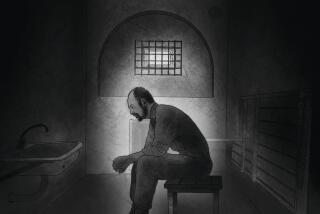East European Leaders Seeking to Redress Wrongs Done to Victims of Communism : Reparations: They say compensation for former prisoners and others oppressed is a matter of priority. But high costs must also be considered.
- Share via
BUDAPEST, Hungary — Magdi Pinter was only 16 when a secret policeman’s knock heralded what was to become a lifelong odyssey of oppression.
Whisked off on an autumn day in the first months after World War II, the schoolgirl disappeared into a nether world of torture, interrogation and absurd accusations.
She was forced to confess to treason and served eight years in Siberian labor camps before learning that her crime had been her acquaintance with a boy caught trying to escape the nightmare of postwar Hungary.
For the pointless imprisonment that consumed her youth and branded her for life as an “enemy of the people,” Pinter now receives a monthly stipend under a government program to compensate Hungarians victimized by Communist zealots.
The payments are token, under $50, and they offer little solace for the shattered lives, broken families and thwarted careers suffered by millions of East Europeans over the last 45 years.
Reparations are also costly for the new governments struggling to avert economic collapse, and some complain that they serve to prolong the pain of the past by compelling victims to recount it.
But reformist leaders of Hungary, Czechoslovakia and Romania have deemed compensation a matter of priority, and private foundations seeking aid for the victims contend that the embrace of democracy will not be complete until the new governments take care of those caught in communism’s continuing cycle of repression.
“Few people realize that, although communism is gone from a large part of the world now, its victims don’t belong to the past, they belong to the present, and someone must help them,” said Istvan Lovas, director of the Foundation for the Victims of Communism, based in Budapest.
“These were often the very people who risked so much for this new order that is here today,” Lovas said. “We owe them more than to let them live out their last days in poverty.”
Lovas’ organization has launched an international fund-raising campaign and hopes to provide grants to needy survivors throughout Eastern Europe and the Soviet Union.
The Hungarian government has bolstered the pensions of more than 60,000 former political prisoners over the last three months, according to Sandor Tutos, director of the Office of Reparations, which opened in September.
The program is considered essential because of the dire state in which many victims still live, Tutos said. Seventy percent of those compensated had been struggling along on incomes below the official poverty level of 6,000 forints a month, about $82.
Most of those tarnished with the label of “political” never recovered to lead normal lives, as Communist rulers tended to justify initial punishment with further repressions. The invisible hands of the state reached out to block jobs and opportunities for anyone tainted by a previous brush with the regime. At the end of their working years, former prisoners failed to qualify for more than a minimum pension, which in today’s double-digit inflation no longer ensures even a Spartan existence.
In Hungary alone, officials estimate that 1.5 million suffered at the hands of Communists who seized power throughout the region after World War II.
Czechoslovaks working to right the wrongs committed under communism say that 250,000 are eligible for compensation there.
The Prague government announced in December that it would make emergency payments of about $300 to former prisoners living in hardship while waiting for final judgment on their eligibility for lump-sum compensation.
But the Confederation of Political Prisoners complains that the reparations program is tangled in red tape and that few Czechoslovak victims--most of whom were punished in the 1950s--are hopeful of living long enough to see justice done.
Hungary’s reparations program will distribute benefits by May to at least 170,000 who were jailed between 1945 and 1963, Tutos said.
Although the current budget of about $33 million will be exhausted by the former prisoners’ claims, Tutos said he expects the Budapest government to eventually compensate those who lost homes, businesses or family heirlooms in the rabid nationalization of the late 1940s.
Both Hungary and Czechoslovakia are considering ways of restoring wealth to those robbed by nationalization, such as giving them vouchers or shares in companies that are being privatized as part of the transition to market economies.
While many victims feel the compensation is too little and that it has come too late, they recognize that resources are limited as Eastern Europe fights its way out of the quagmire of socialist economics.
“The government can’t do much, because the whole country is poor,” conceded Pinter, now a 62-year-old grandmother who draws a pension of about $95 a month and a reparations stipend of only $7. “Besides, no one can tell me that the time between ages 16 and 25 can be given back, at any price.”
More to Read
Sign up for Essential California
The most important California stories and recommendations in your inbox every morning.
You may occasionally receive promotional content from the Los Angeles Times.











